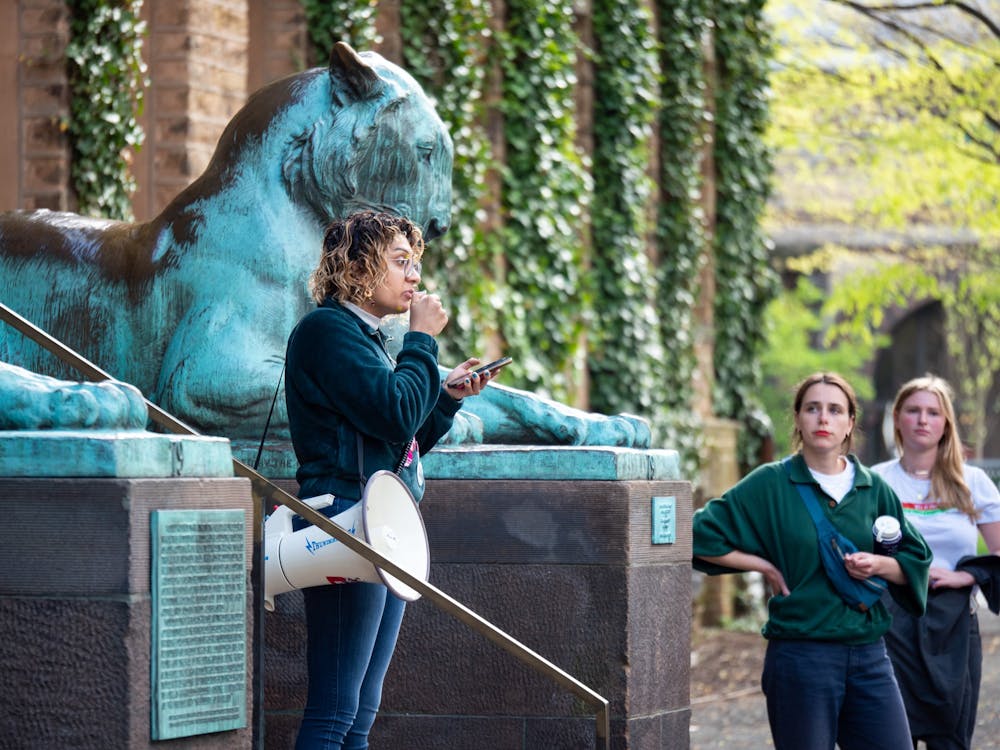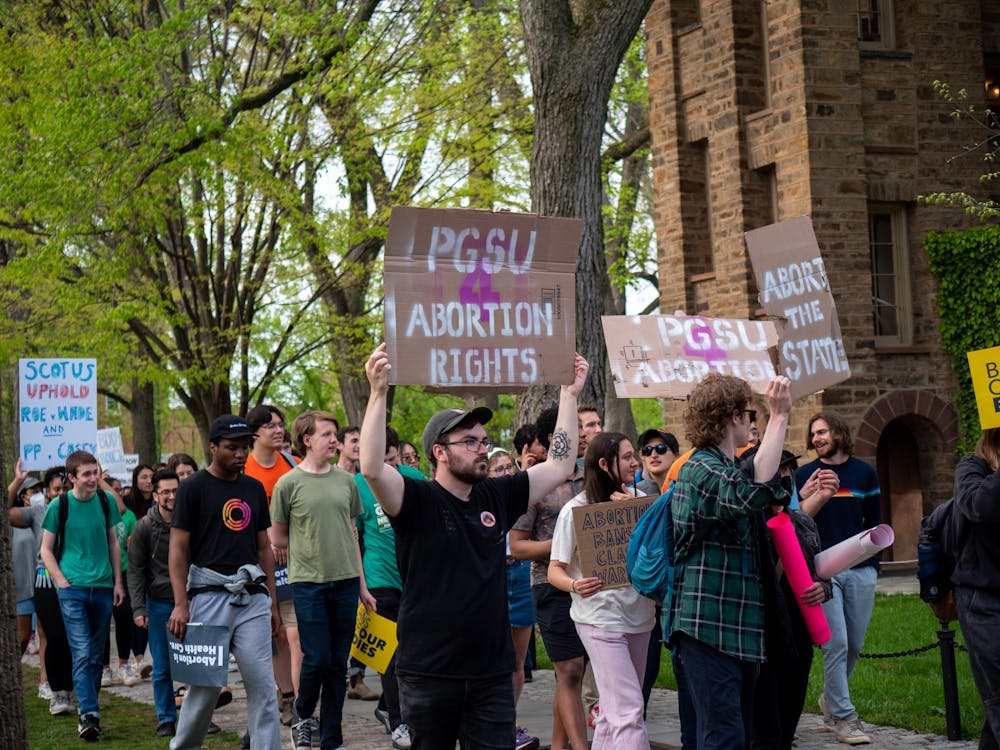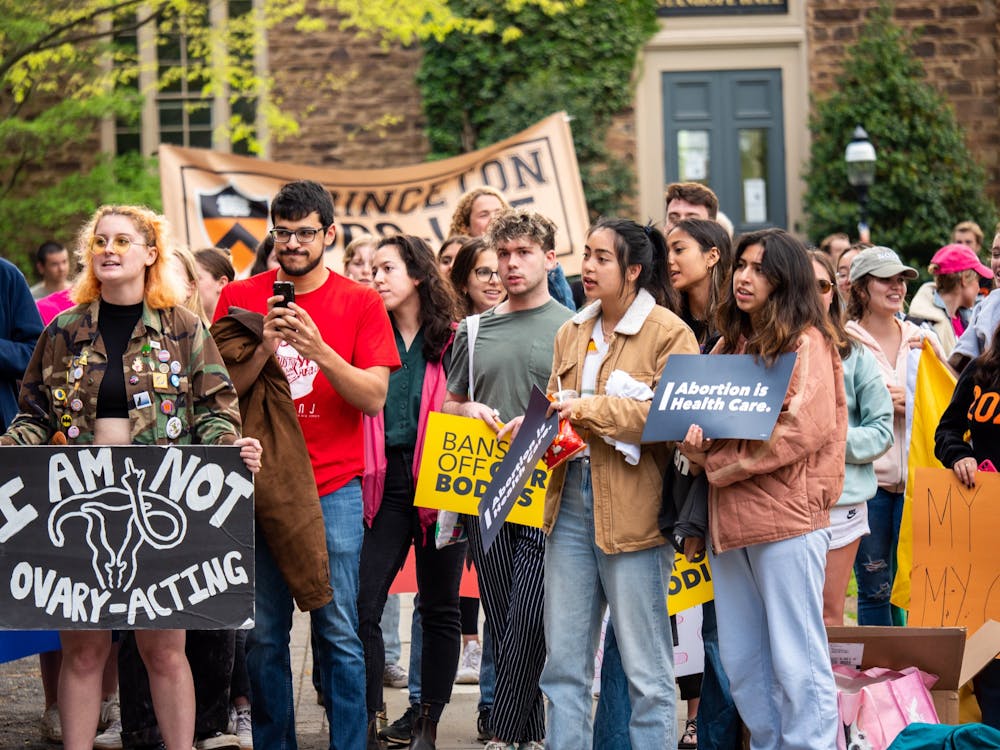Over 100 protestors gathered in front of Nassau Hall on Wednesday in response to a leak, first reported by POLITICO, of the Supreme Court’s majority draft opinion showing that Roe v. Wade will likely be overturned. After speeches and chants from students, some of the demonstrators marched through campus, finishing the protest on Frist Campus Center’s South Lawn.
The event was organized by Princeton Mutual Aid (PMA) and Princeton Students for Reproductive Justice (PSRJ), with help from Unidad Latina en Acción. Around a dozen students attended a Princeton Pro-Life counter-demonstration held about 100 feet from the protest.
Ophelia Vedder GS, who works with PMA and helped plan the event, started the protest by leading the crowd in chants — including “Fuck the courts and legislatures, I am not an incubator” and “Pro-life is a lie, you don’t care if people die” — then gave a speech, arguing that abortion is a fundamental right.
“We’re here today because we know that abortion is healthcare, because we know that access to abortion is a fundamental right, and because we know that abortion on demand is necessary for equal citizenship for all citizens,” Vedder said. “Abortion providers currently face constant death threats for their work providing lifesaving care.”
She ended by calling on the crowd to take action in a “post-Roe world,” especially given that New Jersey has laws protecting abortion.
“We have an obligation to help those who won’t be able to get an abortion in their state, which is why we need to [pressure] Governor Murphy to make New Jersey an abortion refuge state,” Vedder said.
Harshini Abbaraju ’22, who has also been active in reproductive rights and access work, spoke next.
“I know a lot of us feel devastated. We don’t know what to do. That’s why we’re here,” she said. “I think it’s important for us to be clear about how we got to this point.”

For “the conservative political movement in this country, banning abortion has been one of the main points on their agenda for decades,” Abbaraju said. She also argued that a large share of the blame lies with Democratic politicians, saying that they have “consistently thrown the abortion access movement under the bus.”
“The cowardice and treachery of the Democratic Party is very much a part of why we’re here today,” she said.

Harshini Abbaraju ’22 speaks at rally in the wake of leaked Supreme Court opinion showing Roe v. Wade likely to be overturned.
Candace Do / The Daily Princetonian

Abbaraju also discussed the importance of working at the grassroots level.
“Donate to your local abortion fund,” she said. “Local abortion funds are critical, they are the most effective guarantors of abortion access right now.”
Abbaraju concluded by discussing how she believes people should talk about abortion.
“It’s well past time that we drop talking points of ‘safe, legal, and rare.’ I don’t give a fuck if it’s rare. People deserve abortion on demand. That means you can have an abortion if you don’t want to have kids, and that’s fine,” she said. “You don’t need a sob story to deserve basic bodily autonomy.”
The next speaker was Mika Kelley, who works with Princeton Mutual Aid. She shared her experience having an abortion when she was 17 years old.
“I’m grateful for the abortion clinic, the doctors, the nurses, and the woman who put her arm around me and guided me inside, past the crowd of screaming people who were telling me that I was gonna go to hell,” she said.
Kelley also directly addressed the crowd, calling on those present to take action.
“Overwhelmingly, the people who will need active support [with] abortion will be poor and working class, so if you have the means, give support to those who do not by donating,” she said. “If the government is going to legally take away the bodily autonomy of people who can have babies, then we need to fight like hell.”
Following Kelley’s speech, the crowd proceeded to march around campus, walking along Chapel Road to Firestone Library before circling back and proceeding along Elm Drive to McCosh Walk. The group then walked to Frist Campus Center, passing through it and finally gathering on its South Lawn.
Vedder, who led the crowd, told The Daily Princetonian that the march was not planned beforehand.
“Someone from PMA came up to me and said, ‘Listen, there’s so much energy here. People are really excited about what’s going on, so why don't you capitalize on that and do a march to keep the momentum going?’“ Vedder said.
Vedder also said that she was very happy about the community response.
“I thought that overall, the rally was cathartic and therapeutic, and I learned a lot from the other two speakers,” she said.
Emily Schoeman ’23, who serves as co-president of PSRJ, echoed those sentiments, telling the ‘Prince’ she “was happy to see people of all ages and gender identities” turn up.
Pro-life student organizer reflects on counter-demonstration
Tommy Martinson ’22, who organized the Princeton Pro-Life counter-gathering, told the ‘Prince’ he hopes there is one thing students on both sides of the issue can agree on.
“I think a lot of people on both sides agree that the Supreme Court shouldn’t be legislating on an issue as serious as abortion, that is something best led by the people,” he said. “And that’s the main force of the leaked Roe decision is returning power from the courts to the people in the legislature.”
Ultimately, the decision for him is about protecting the “right to life.”
“The most vulnerable in our society deserve equal protection, and that’s a right to life,” Martinson added.

Princeton Pro-Life organizes a counter-demonstration.
Candace Do / The Daily Princetonian
Students from states likely to be impacted by SCOTUS decision express fears, anger
Some at the pro-choice rally shared their personal concerns as students from states where abortion is likely to be severely constricted if Roe were to be overturned.
Allison Thomas ’25, a student at the pro-choice protest, spoke to the ‘Prince’ about the potential impact of the decision on her home state.
“I’m from North Carolina, [and] there’s lots of places in North Carolina that I think do have some good health care, but where I’m at, it’s a very rural region where we have to travel far to get to abortion clinics,” she said. Thomas said that this decision will make it very hard for people to do that.
Rachel Posner ’23, hailing from Louisiana, shared a similar concern, saying that this decision “hits close to home in terms of [her] rights and access” to abortion.
Posner is a Senior Sports Writer for the ‘Prince.’
To Claire Kaneshiro ’25, who is from Indiana, the likely overturning of Roe v. Wade comes as little surprise.
“Abortion has been slowly limited in access for like decades now. I think the entire time I’ve been aware of politics in Indiana, it’s been chipped away at. So this just feels inevitable,” she said.
Abbaraju called the leaked decision a “wake up call.”
“The leaking of that decision was like a wake up call for a lot of liberal Americans who probably knew in the back of their minds that there was some precarity around abortion access, but have not taken the time to actually fully understand just how bad the situation is,” she told the ‘Prince.’
Going forward, Abbaraju and Schoeman emphasized the importance of supporting local abortion providers.
“My hope is that in the future, there will be federal legislation that codifies this right,” Schoeman said.

Community members march through campus holding signs promoting abortion rights.
Candace Do / The Daily Princetonian
Sandeep Mangat is an Associate News Editor who has reported on labor shortages on and off campus, University guidelines regarding the COVID-19 pandemic, international student life, and research led by Princeton faculty. He can be reached at smangat@princeton.edu and on Twitter @s_smangat.
Correction: A quote by Harshini Abbaraju has been updated due to a transcription error.








